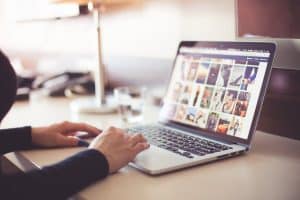How to Speed Up Your WordPress Website: 10 Actionable Tips
If your site isn’t loading fast enough, you may lose visitors and your ranking position may be impacted. Here’s how to speed up a WordPress site.
According to HubSpot, 70% of consumers are not willing to buy from an online retailer with a slow website. Then again, Google reports that the average mobile website loading speed is 15.3 seconds, which is extremely slow.
In order to keep your visitors on your website, it needs to load in as little as 1-3 seconds. Each additional second will drive visitors away and lower your SEO rankings.
Here are 10 essential tips to speed up WordPress site, help you boost traffic, and get discovered online.
1. Switch to a Different Web Hosting
Your hosting can determine and affect your website speed. The more resources you share with other websites, the higher the chances of a slower website. At the same time, the type of website you’re building should determine the type of hosting you choose.
For example, if you’re just starting out with a simple website, you don’t need an advanced hosting plan but if you have a high-traffic website, you should get either cloud or dedicated hosting.
2. Remove Unnecessary Media
One of the most common reasons your WordPress website is slow is because of the big image file size. Whenever you add an image to a page or a blog post, you’re using up available server space and slowing down your website. Then, there are things like GIFs, videos, featured images, logos, and all kinds of media taking up space.
To speed up your website, you need to clean up your media library. Delete duplicate files, enable image optimization plugins on the website, and try to reduce the media file size before uploading to WordPress.
3. Turn Off Trackbacks and Pingbacks
Trackbacks and pingbacks happen when another website links to yours. While this is great for SEO, it’s bad for your website speed. Essentially, each pingback and trackback is a link that sends a new request to your servers, which can be detrimental to your website speed.
You can turn off this setting by going to your WP dashboard, and clicking on Settings -> Discussion -> Uncheck the Allow link notifications from other blogs -> Save Changes.
4. Use a Well-Made Theme
Your WordPress theme is one of the major factors contributing to a fast website. If it’s made by professional developers, it shouldn’t slow down your website. It means the code is clean, there are no unnecessary elements, and it’s optimized for all devices.
If the theme is clunky and sends too many requests to the server, it means there are elements in there that are either unnecessary or badly made. Your best choice is to buy a theme from WordPress-approved designers or professional web designers whose themes have positive reviews.
5. Deactivate and Delete WordPress Plugins
WordPress plugins are sometimes necessary to give your website a boost in terms of performance, optimization, and customization. But the more plugins you use, the more you’re risking the speed of your website.
Not all plugins will slow down your website but those you’ve installed and deactivated may still hold data in the background. Deactivate and delete all plugins you’re not using that are not essential for the functioning of your website.
6. Avoid Hosting Videos On The Site
Another very common cause of a slow website is hosting videos on the servers directly. This is why it’s best to either not use them at all or if you must, to host them on a different platform like Vimeo or YouTube and then embed them on your website. This way, you can still have videos without them slowing down your website.
Because videos hosted directly on your website require a lot of bandwidth, the more you host, the sooner you’ll need to get a different, more expensive plan with your hosting provider. This is why the best option to speed up your website is to host videos externally.
7. Use a CDN (Content Delivery Network)
A Content Delivery Network (CDN) is a network that serves as the home of all web servers worldwide. In other words, if your WordPress site is in the United States and you have a visitor from Australia, the website would take forever to load.
This is why hosting providers have servers around the world and use them to load your website based on your visitors’ location. If you want to speed up your website, you need to use a CDN for your website to load equally fast for everyone, no matter where they’re from.
8. Update Your Theme and Plugins Regularly
Your theme and plugins are not a one-time thing. Their developers keep releasing updates to keep your website safe but also optimized and fast. If you don’t update them regularly, this may lead to security issues and it can also slow down your website.
That said, you can set up WordPress to update everything automatically but for the sake of your website speed, you shouldn’t do that. It’s better to update plugins and themes manually so you always have control over the changes these updates will bring to your website.
9. Enable Caching In WordPress
If you want to speed up your website, you need to enable caching in WordPress. Caching serves your visitors a static version of your website every time they click on it. In other words, every new visitor sends a new request to the server, which then needs to load the entire website and all its data.
To speed up the website, caching displays a cached version that doesn’t send server requests. You can enable caching via a plugin and choose a hosting provider that offers caching with their packages.
10. Reduce the Number of Redirects
When you have a page that shows a 404 error, it’s usually redirected to a different page via URL redirect. This can slow down your website because there are essentially two pages sending requests to the server.
You can check if you have any 404 pages or redirects manually but if you have a bigger website, you should use a plugin or some type of tool to discover the number of redirects and fix them.
These Tips Will Help You Speed Up Your WordPress Site in No Time!
Whether you’re building a website for the first time or want to learn how to speed up WordPress site you already own, these tips will help you make it happen. From choosing the best hosting package to decluttering your media library, these are the 10 most important ways to make your website faster.
Ready to optimize your website and improve its performance? Finding the right hosting provider is the first and most important step! Check out our hosting packages to find the perfect fit for your website today!



